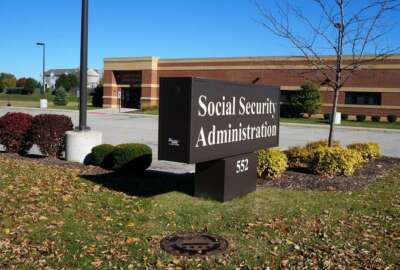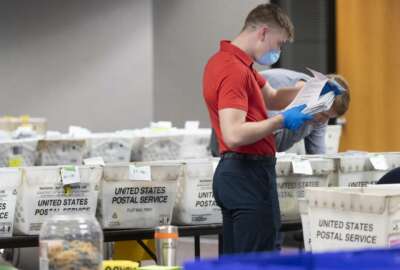 First Look
First Look More members of Congress are calling on USCIS to delay furloughs
In today's Federal Newscast, more members of Congress are calling on Citizenship and Immigration Services to delay upcoming employee furloughs at the end of the...
To listen to the Federal Newscast on your phone or mobile device, subscribe in PodcastOne or Apple Podcasts. The best listening experience on desktop can be found using Chrome, Firefox or Safari.
- More members of Congress are calling on U.S. Citizenship and Immigration Services to delay upcoming employee furloughs at the end of the month. Top Democrats on the House Homeland Security Committee wrote to USCIS Deputy Policy Director Joseph Edlow. They say USCIS has enough carryover funds to avoid furloughs at the end of the month. Sens. Tim Kaine (D-Va.) and Mark Warner (D-Va.) made a similar argument to the agency, as well. USCIS is planning to furlough over 13,000 employees on August 30, without emergency funding from Congress.
- Fiscal 2021 could see the return of the dreaded word “sequestration” if the House passes its appropriations bill as is. The Office of Management and Budget is warning that the current House discretionary spending limits for the non-defense agencies will breach the $626 billion budget cap by more than $1 billion dollars. In its sequestration report to Congress, OMB says it didn’t analyze the Senate spending bills because they hadn’t started considering legislation. Discretionary spending under the defense category came in $1 million dollars under the cap.
- The Defense Department is ready to move a new cybersecurity program from pilot to full production. The Pentagon is trying to limit its exposure to one of the biggest cyber threat vectors: your internet browser. Through the cloud based internet isolation program, DoD stops potential malicious code and content from directly getting access to its networks. The Defense Information Systems Agency awarded an Other Transaction Agreement production contract to By Light Professional IT Services worth almost $199 million to expand the CBII program from pilot to full production. This was the first production OTA DISA awarded. DoD began exploring this web browser security concept in 2016 and started testing this approach in 2018.
- The House passed a bill to give the Postal Service $25 billion to withstand short-term challenges, but President Donald Trump is threatening to veto the bill. In addition to the funding, the bill would undo recent operational changes implemented by Postmaster Louis DeJoy to cut transportation costs. The Postal Service says it will work with Congress to reach a deal on long-term postal reform legislation.
- The Defense Department awards four new contracts to strengthen the industrial base during the coronavirus pandemic. The contracts, worth more than $17.4 million, were signed through the Defense Production Act. One contract for $3 million went to BioFire Defense to expand capacity for molecular diagnostic testing. Another contract worth $7 million, was awarded to Leonardo Electronics US to produce laser components. So far, DoD along with Health and Human Services and FEMA have awarded more than $400 million in contracts through the Defense Production Act.
- The Navy is slow at fixing its ships and that is directly affecting sailors. Between 2015 and 2019, 38 of 51 ship maintenance periods were not completed on time. That translated to nearly 7,500 days in delays. A new Government Accountability Office report says the slow repairs directly affect military readiness because they reduce the time aircraft carriers and submarines are available for training. The causes for the delays are mostly due to workforce performance and capacity issues. As a result, the Navy relies on excessive use of overtime. The Navy spent nearly three billion dollars over the past five years to better the timeliness of its ship maintenance.
- New leaders take the helm at two combatant commands. Army Gen. James Dickenson takes over as chief of U.S. Space Command, succeeding Air Force Gen. Jay Raymond. Air Force Gen. Glen VanHerck takes over at U.S. Northern Command. It is likely the two leaders will often work together since many missile and space capabilities reside in and protect the U.S. homeland.
- The Office of Personnel Management will launch this year’s Combined Federal Campaign (CFC) on September 21. Federal employees will have until January 15, 2021 to donate their time or money to thousands of local, national or international charities. Employees can donate through an online giving platform. The campaign once again will not accept cash donations. Federal employees donated a total of $2.6 million during the special CFC solicitation period which OPM launched during the height of the pandemic this spring.
- The Federal Labor Relations Authority delivered another blow to unions. FLRA ruled federal unions cannot use official time for grassroots lobbying. The authority says unions can still use official time to directly lobby members of Congress. But labor representatives cannot use official time to contact union members or the public to support or oppose legislation, as an example. The new policy decision came at the request of the anti-union National Right to Work Legal Defense Foundation. The National Treasury Employees Union says it’s asking the U.S. Court of Appeals to review the FLRA decision.
- The IRS is putting a hold on sending automatic balance-due notices to households, because the agency has yet to process some payments in the mail. The IRS says payments in unopened mail will be credited on the date the agency receives them, rather than the date the agency opens and processes them. The agency’s decision comes days after House Ways and Means Committee Chairman Richard Neal (D-Mass.) said the notices created confusion for taxpayers. The IRS had 12 million pieces of unopened mail this summer because fewer employees were coming into the office under mandatory telework.
- Telework may continue for some time at the Social Security Administration. SSA says most employees will continue to telework for an extended period of time. The agency will continue to handle appointment-only in-person services at its local field offices for some time too. SSA released a new reposturing plan to its employees late last week. The plan is light on details. But it describes how SSA may ask some employees to come back into local and field offices to handle non-portable workloads, first at 25% capacity and then 50% capacity. Some employees have already been back at local offices on occasion to process the mail or meet members of the public. (Federal News Network)
Copyright © 2024 Federal News Network. All rights reserved. This website is not intended for users located within the European Economic Area.
Peter Musurlian
Peter Musurlian is a producer at Federal News Network.
Follow @PMusurlianWFED
Related Stories
Getty Images/Photodisc

DISA working on improvements to telework, ensuring it’s here to stay
(Mark Hoffman/Milwaukee Journal-Sentinel via AP)

USPS drafting ‘ambitious plan’ to cut delivery network costs after election
Related Topics
Agency Oversight
All News
Citizenship and Immigration Services
Combined Federal Campaign
Congress
Federal Drive
Federal Labor Relations Authority
Federal Newscast
Government Accountability Office
IRS
Louis DeJoy
Mark Warner
Office of Management and Budget
Office of Personnel Management
Pay
Pay & Benefits
Postal Service
Social Security Administration
telework
Tim Kaine
Tom Temin
Workforce



